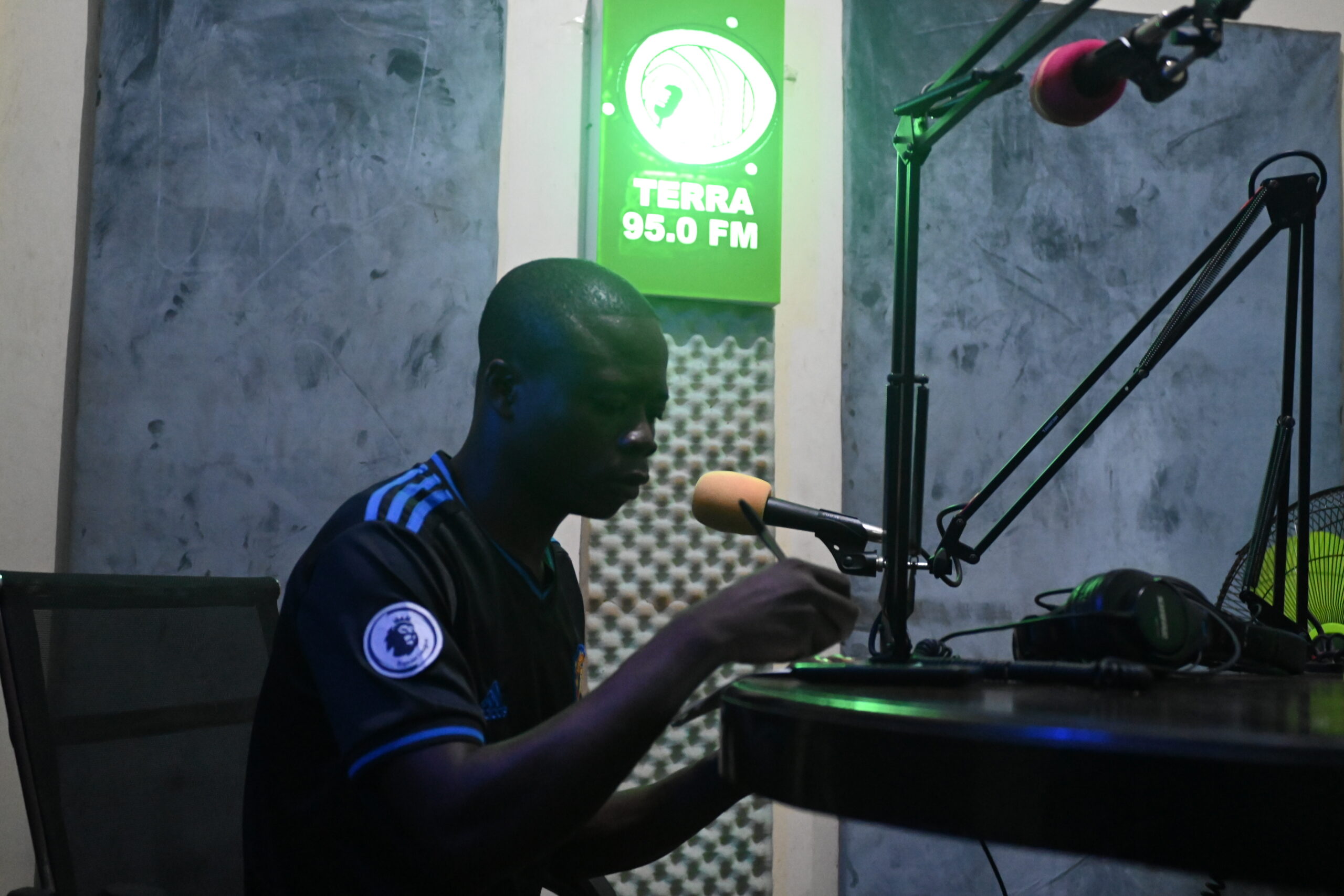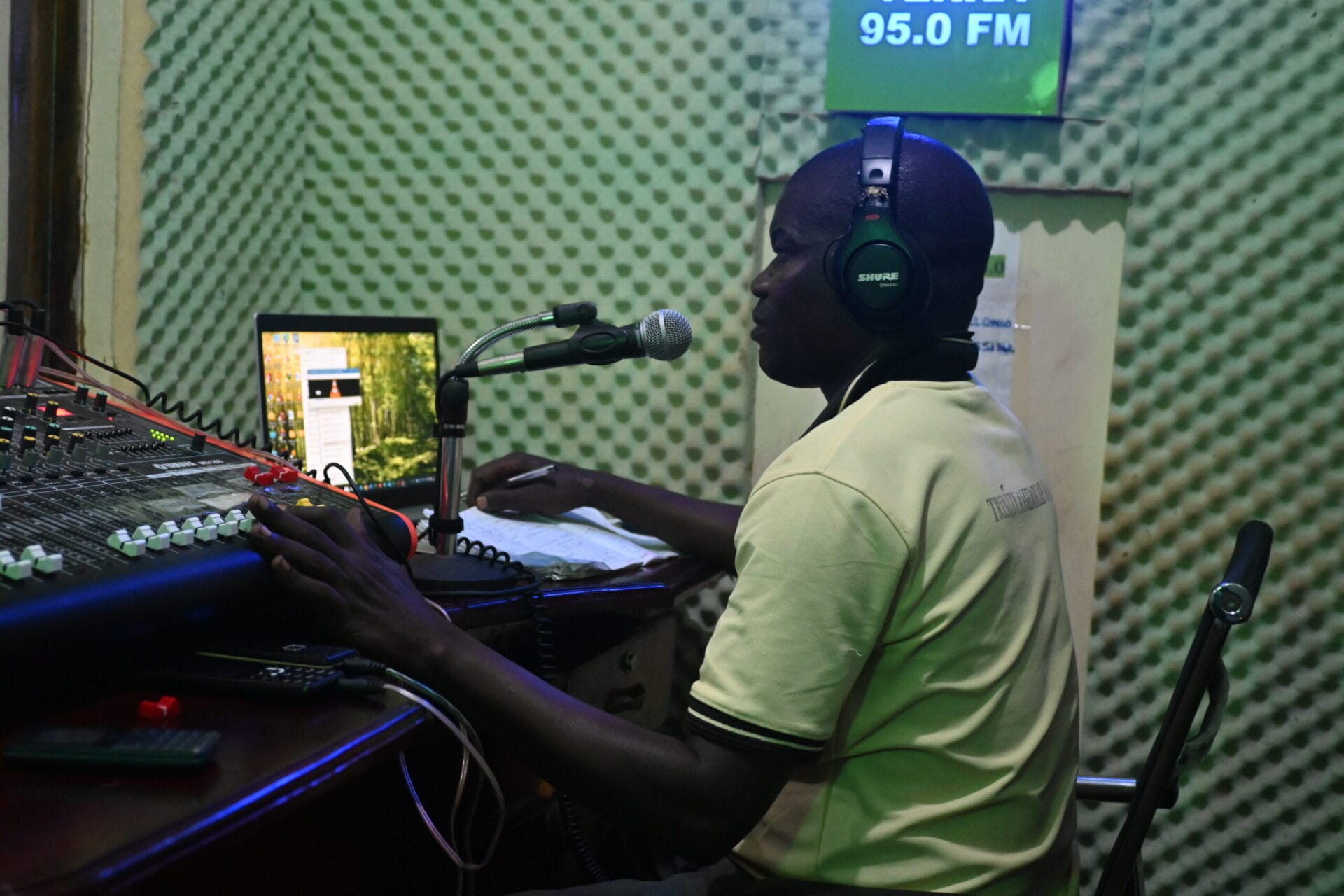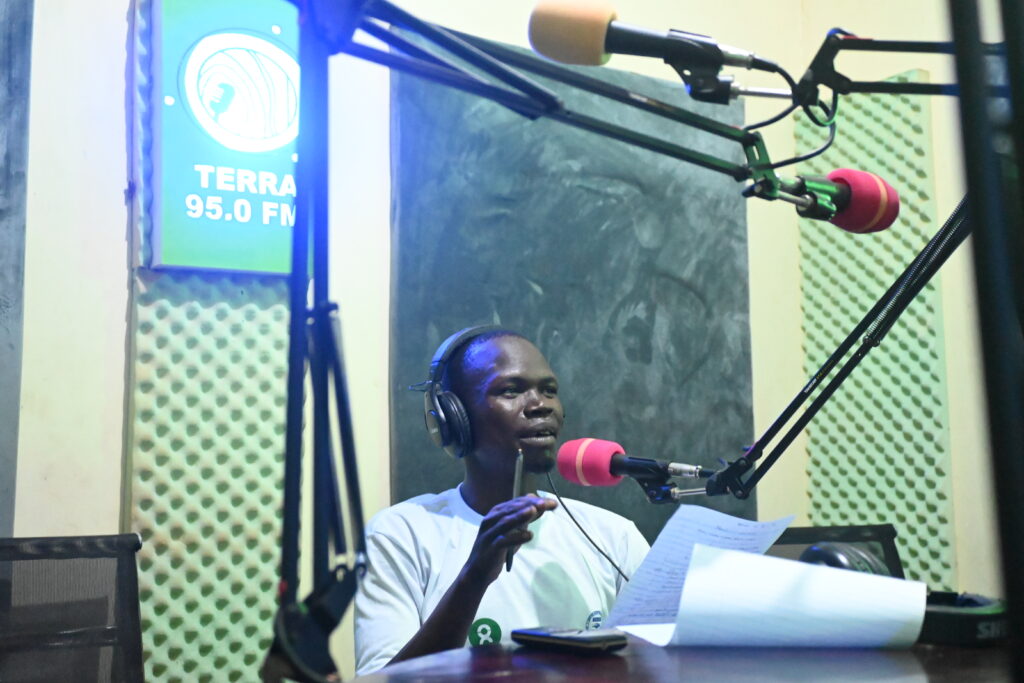Terra FM aims to shed light on the complexities of the Albertine Region, informing listeners about pertinent issues ranging from health and agricultural security to conflict management. To do so, the strategy involves environmental education, the promotion of fundamental rights, and the dissemination of Indigenous culture.
The long-term objective is to use community radio as a testing ground for a paradigm of community-based development that encompasses the direct needs and rights of civil society. The adhered-to principles are those of ecofeminism.
Radio Terra FM’s mandate is derived from Article 15 of the United Nations Declaration on the Rights of Peasants and Other Rural People, which states, “Peasants and other rural workers have the right to adequate food and the fundamental right to be free from hunger.” This includes the right to produce sustenance and the right to adequate nutrition, which ensure the highest level of physical, emotional, and mental development. In addition, Article 11 of the same declaration states that “Peasants and other rural workers have the right to seek, receive, develop, and disseminate information, including information about factors that may affect the production, processing, marketing, and distribution of their products.”
“Kilimo” is the Kiswahili word for cultivation. This is the flagship program of Radio Terra for and by farmers, which is transmitted from 7:00 to 10:00 p.m. every Monday. The program’s objective is to provide free agricultural extension services and other technical support related to pest and disease awareness, as well as platforms for farmers to interact, pose questions, and provide feedback on farming-related issues. This program is led by qualified agronomists and experts who are invited from the government and within communities to share experiences and provide technical agricultural extension advice to farmers who, due to their remote geographical locations, are unable to receive extension services from government agricultural institutions or even non-governmental organizations working in the field of agriculture and food security.
Through educational radio broadcasts, Radio Terra FM advocates for and promotes climate-smart and nutrition-sensitive agriculture among rural peasant farmers in the Lake Albert region, encouraging sustainable agriculture and environmental protection. Radio Terra FM broadcasts daily programs on agricultural management, environmental protection, and market access to nearly 5,000,000 smallholder farmers in Uganda and the Democratic Republic of the Congo. Furthermore, the radio program focuses on developing political competencies for farmer’s group members as well as social category-based public conversations and participation procedures among farming communities.

Radio Terra FM broadcasts in a variety of regional languages, including Lugungu, Runyoro, Lingala, Swahili, and Alur (Luo dialects). These projects target farmers in two countries: Uganda and the Northeastern Democratic Republic of the Congo.
As a result of this program, which is broadcasted on Radio Terra FM, farmers in the final mile are able to improve their farming practices and gain more information about market access, which likely results in improved income.
Radio Terra FM also broadcasts public health and basic health care information. This is done to promote the notion of preventative community health in order to lower the high illness burden through behavior change education, as well as promoting connections with health facilities for access to medical advice. According to recent reports and testimonies from health officials who have been presenting programs on Radio Terra FM, the disease burden of malaria and gastrointestinal infections has been reduced by nearly 50% among smallholder farmers in the region where Radio Terra FM broadcasts.
Conservation, Agriculture, and Livelihoods
The Albertine Rift region of DRC and Uganda, where Radio Terra FM broadcasts, is a world-renowned biodiversity hotspot, home to endangered wildlife such as eastern chimps, African elephants, and pangolins. However, there is an increase in habitat degradation, fragmentation, and human-wildlife conflict when forest reserve tree cover used by animals is encroached upon for subsistence farming. Agriculture yields are insufficient to provide local food security, and agricultural contribution to the economy is further hampered by a lack of value addition and market growth. Local farmers are extremely sensitive to the effects of climate change, such as changing rainfall patterns that affect rainfed staple crops, flooding, and pest infestation. Farmers’ tolerance for wildlife is decreasing as the possibility of catastrophic crop loss looms.
Agricultural yields are declining, and food insecurity is spreading across the region as a result of inadequate soil management and climate variability. Farmers are chopping and burning more forests for cropland in order to cultivate the same amount of food and cash crops. They are also planting more crops on wetlands. Although Farmers in the Lake Albert region understand that forests serve as safety nets during droughts and hunger and that their forested areas are shrinking, increased poverty makes it difficult for them to avoid using resources that also provide critical habitat for unique and threatened biodiversity.

Actions
In their goal to serve the public interest, the media, and journalists play a critical role in reacting to these risks and challenges, informing, educating, stimulating dialogue and sharing initiatives and solidarity networks, and exchanging global and local solutions. The media can provide keys to help the populace understand and develop adaptability and overall societal resilience. This is true for Radio Terra FM’s broadcasting activity in the region. Radio Terra produces news bulletins, interactive dialogues, features, in-depth stories, short spots, and awareness campaigns on climate-smart agriculture, environmental conservation, tree planting, market access, and weather forecasts, among other things. Local, regional, and national concerns are examined and contextualized via the testimony of vulnerable groups, connecting the issues and their ramifications to citizens’ daily lives and empowering them to be change agents.
Radio Terra FM’s programs, as well as debates, have brought together farmers, fishermen, political actors, civil society, and large and small businesses, and promoted educational insights to an annual audience of over 15000 million people via FM broadcast.
The following basic activities have been the primary focus of Radio Terra’s agricultural and climate resilience work: the production of programs that promote awareness of the issues of combating global warming and help the transition to green economies and societies in the Lake Albert region. The programs are created in languages that are widely known by the region’s rural people. Radio Terra conducts environmental education, tree planting, and climate-smart agriculture, as well as effective campaigning for the preservation of degraded land and forests.
Food security and healthy nutrition program has been promoted and broadcasted educating the population about food security.
Dissemination of best farming techniques, including agroecology information, through agricultural extension services is a core part of Radio Terra FM activities including mobilizing farmers to take direct action against unlawful land sales, forced evictions, and land grabbing.
Terra FM educates farmers on how to diversify best practices such as coffee, aquaculture, oilseeds, and livestock while focusing on the environmental and resilience benefits of diverse agricultural systems and integrated soil fertility management as well as leading an attempt to establish smallholder listening groups in villages around in the region where it broadcasts. This has enabled farmers’ groups to exchange knowledge and lessons on various topics.
Production of radio broadcast programs and campaigns against illegal wildlife trafficking, poaching, and trade in endangered wildlife and plant species has raised public awareness of the issues, as well as raising awareness about wildlife and plant species protection and conservation.
As a result, we are certain that there is evidence of a greater understanding of the challenges by people, and people are becoming motivated to develop adaptation and conservation solutions for the ecosystem on which they rely. Furthermore, political and civil society leaders, as well as corporations, are beginning to recognize the importance of environmental protection and are taking an active part in developing and implementing appropriate solutions at the local level.
A culture of conversation and solidarity has been established and is deepening as a result of the exchange of initiatives and know-how among the various actors, raising awareness of the environmental crises. Farmers are reporting better yields and income for smallholder farmers in the Lake Albert region as a result of Radio Terra FM’s efforts.
Access to agricultural information, weather updates, markets, and product information has been improved for smallholder farmers in the Lake Albert region.
Smallholders have gained the ability to speak and be heard on all issues concerning their job and challenges, among others.

Challenges
Despite its accomplishments and good deeds to promote conservation, livelihoods, and agriculture in the remaining miles of Africa’s Albertine rift, Radio Terra FM suffers some technical obstacles, notably an unreliable power source. Sometimes the station loses electricity for two or three days. Sometimes equipment fails and must be changed, such as generators and backup batteries, which are frequently destroyed due to insufficient charging.
The Radio Terra FM team recognizes these challenges, considering that there is no grid electricity in the region where Radio Terra FM is located. The hot, dry, and dusty circumstances reduce the life of the generators. Poor quality fuel also contributes to wear and tear. Spare parts for broadcast equipment are difficult to find in local marketplaces in the distant locations where Terra FM is located.
Furthermore, the extreme conditions necessitate extensive maintenance of generators, transmitters, and other radio equipment. Radio Terra FM is subjected to extreme weather: temperatures can overheat equipment over the majority of the year when temperatures reach 40 degrees Fahrenheit. Dust from the dry climate also quickly damages the equipment. The rainy season causes additional issues since dirt-track roads become wet and unusable for extended periods of time, causing repairs, spare parts, and servicing to be delayed. Transporting equipment to sites can be expensive and time-consuming because it can only be done during the dry season.
It is also difficult to find skilled and dependable maintenance engineers and low educational levels make training local workers to maintain sophisticated equipment challenging. Given Radio Terra’s rural position near the Uganda-DR Congo border near Lake Albert, station workers are relatively new to working in radio in the first place, and there aren’t many broadcast and electrical engineers in the region. Radio Terra does not employ a station engineer on site; instead, the station relies on remote support and visits from Arua, Kampala, Nairobi, and the United States at typically quarterly intervals. If a piece of equipment fails and the team on the ground is unable to repair it, the station may remain off-air for several days.
As a result, the Environmental Defenders’ teams are examining potential solutions to the problems impeding radio functioning. We ask our partners and colleagues to help and support us with solutions such as technical support in radio engineering, energy support, or even the viability of radio broadcasting in the current situation.



